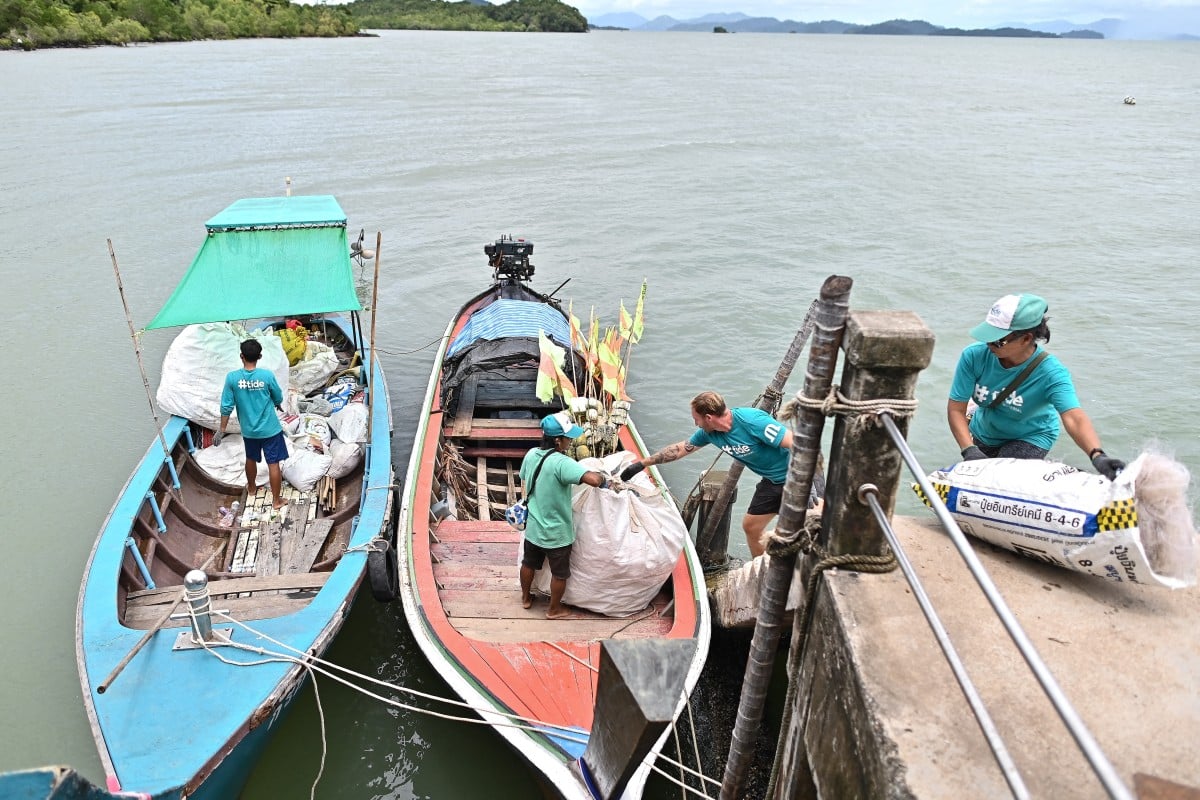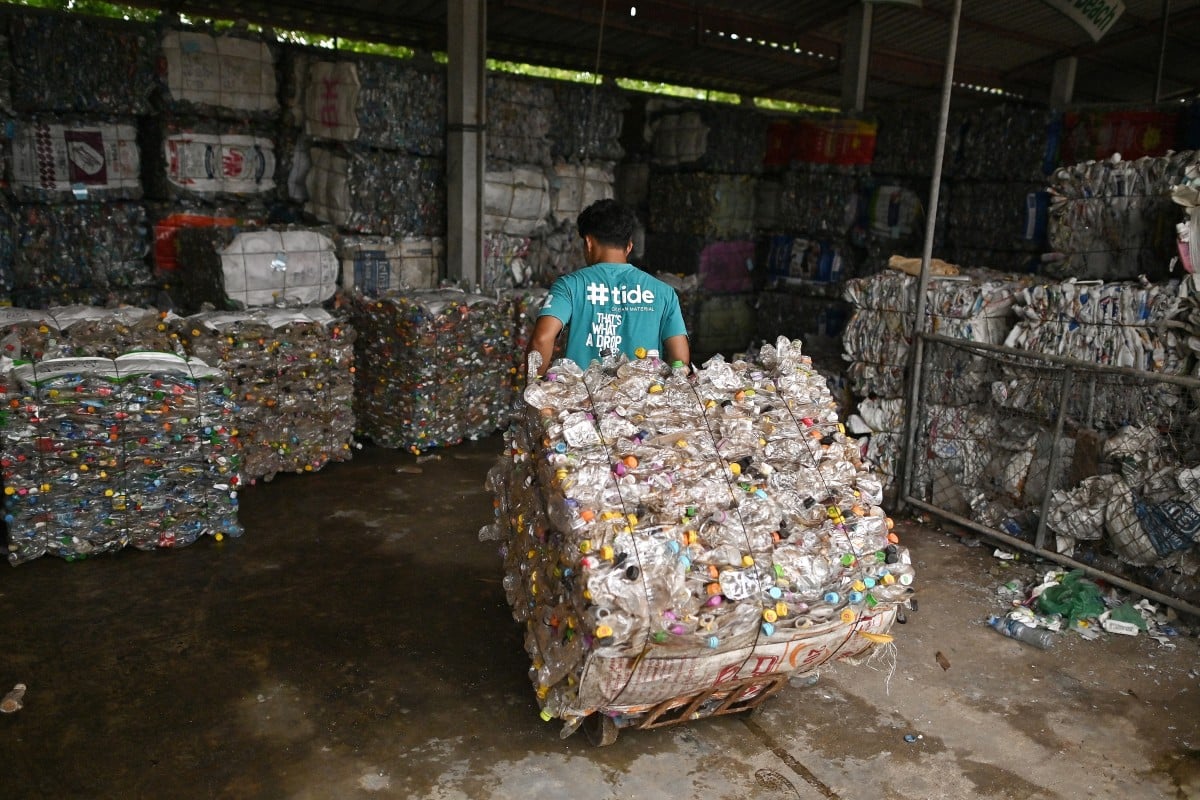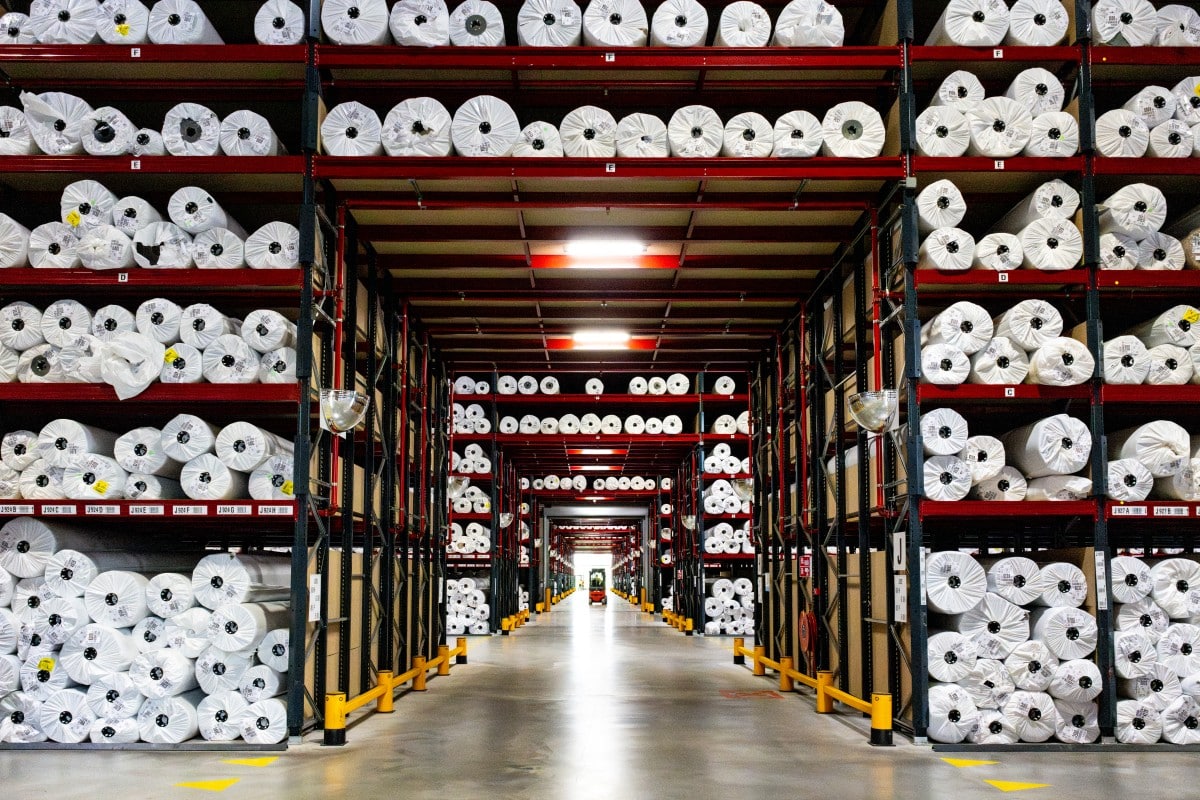lucky rainbow ‘New wave’ as start-up sweeps up Thai ocean plastic

This photograph taken on September 24, 2024 shows Tide staff members unloading bags of plastic waste collected from a Moken fishing village at the pier on Thailand’s southern island of Koh Chang in Ranong province. Agence France-Presse
THAILAND — As a long-tail boat arrives at a fishing village on the southern Thai island of Koh Chang, residents gather to sell their wares — not seafood, but plastic.
The villagers, members of the semi-nomadic Moken people, are selling to Tide, a start-up attempting to create new value from old plastic collected from or near the sea.
Article continues after this advertisementRecyclers have long scooped up some of the over six million tonnes of plastic that the Organization for Economic Co-operation and Development estimates enters the ocean each year.
FEATURED STORIES GLOBALNATION Trump, White House sign deal to begin transfer of power GLOBALNATION Marcos, UAE leader tackle maritime issues, regional stability GLOBALNATION China investigates defense minister for corruption – reportREAD: Experts meet as final global plastic treaty talks near
But Tide works directly with everyone in the process, from collectors in remote Thai fishing villages to carpet manufacturers in the Netherlands.
Article continues after this advertisementIts plastic is traceable and certified as “ocean-bound” — a process that involves annual audits by an NGO.
Article continues after this advertisementIt is processed using a method Tide says results in a recycled product of comparable quality to virgin plastic.
Article continues after this advertisement“We are convinced there is more than enough plastic in our world and we should take what already exists,” said Marc Krebs, a co-founder of the Swiss company.
READ: How single-use plastic still rules the world
Article continues after this advertisementOn Koh Chang, a 30-minute speedboat ride from the sleepy southern town of Ranong, the Tide boat’s arrival prompts a flurry of activity.
Mimi, 65, has brought out several old rice sacks of bottles that join a growing heap of torn fishing nets, old rope and discarded jerrycans.
“The more I collect, the more arrives. I can’t collect it all,” she told AFP, declining to give a family name.
The villagers live along the beach in ramshackle wooden homes on stilts.
Underneath, the high tide mark is clear — behind it is a carpet of refuse, from polystyrene boxes and flip-flops to take-away cups and crisp packets.
READ: Lilly, Thailand’s Greta Thunberg, wages ‘war’ on plastic
Only a small portion is commercially viable for recycling. Tide buys six categories, including fishing nets and common types of plastic bottles (PET) and cartons (HDPE).
“Each day, we have a lot of products that we can’t sell and can’t recycle, and I’m sure there is much more of it in the ocean,” Tide’s Thailand operations director, Nirattisai Ponputi, told AFP.
Onerous sortingWhile the market price of recycled plastic fluctuates, Tide pays a set rate on Koh Chang to encourage continued collection.
And they sometimes take items that can’t be recycled because the island has no waste management options, so the alternative is mostly open burning.


This photograph taken on September 23, 2024, shows a Tide staff member pulling a cart of full of waste plastic PET bottles bales at the Tide’s recovery facility in southern Thailand’s Ranong province. Agence France-Presse
Even recyclable items can be challenging.
Bottles with stamped logos must be “hotwashed” before processing, colored plastic can contaminate recycled material, and most ink-printed labels cannot be recycled.
A PET soft drink bottle might have an HDPE cap and a PVC label, creating an onerous sorting process.
Sometimes it isn’t even clear what plastic has been used, so Tide uses a spectrometer to work out what can be recycled.
“There are no regulations about the plastic that you can put in your product, so it’s left on the shoulders of the collectors to work it out,” said Capucine Paour, Tide’s external project manager.
Plastic collected on Koh Chang and surrounding islands goes to Tide’s Ranong facility, where workers painstakingly sort it again before pressing it into bales.
Founded in 2019, Tide collects around 1,000 tonnes of plastic a year from Thailand and other locations including Mexico.
“It’s still a very small amount” compared to the global scale of the problem, acknowledged Krebs.
‘Ban is better!’The collected plastic is processed into pellets before being shipped to customers like Condor Group, one of Europe’s largest carpet manufacturers.
The firm uses recycled material from Tide and elsewhere for around a quarter of its products, including rugs, car mats and artificial grass.
“Tide is really unique,” said Jan Hoekman Jr, one of the company’s directors.
“You can follow the product from collection to the final products, which you see here. That’s all transparent, which is very important if you talk about sustainability.”
Tide says its product is 40 percent more expensive than virgin plastic, but customers like Condor Group are willing to pay a premium.


In this photograph taken on October 14, 2024 carpets made with recycled plastic sourced from Thailand are stacked up at a Condor Carpets factory in Hasselt, northeastern Netherlands. Agence France-Presse
“We see sustainability not just as a trend, but more as stewardship for future generations,” said Hoekman Jr.
Condor Group’s buzzing production lines feel a million miles from the quiet off-season beaches of Koh Chang, where Wiranuch Scimone, 54, collects plastic for Tide.
In her 20 years on Koh Chang, she has seen the waste washing ashore go from mostly fishing nets to huge amounts of unrecyclable polystyrene foam that locals often end up burning.
The monsoon waves bring in so much trash that she sometimes spends hours on a beach without being able to collect it all.
“It would be best if there were no plastic,” she said, adding in English: “Ban is better!”
Tide, a for-profit company, is still a relatively small operation, but it is expanding, moving into Ghana next.
“You have to start somewhere,” said Krebs.
Subscribe to our daily newsletter
“We are quite convinced that we are at the beginning of a new wave.”lucky rainbow
READ NEXT Seoul’s first snowfall could hit hard, warns weather agency Three dead in Thailand shooting, suspect at large EDITORS' PICK General to lawmakers: No grumbling in AFP amid political spat TIMELINE: The brutal killing of Neca Denise Lagria in Cebu UAAP: Adamson barges into Final Four, knocks off UE John Arcilla to celebrities joining politics: Bakit ka nandyan? Brawner: It’s not true that I will take over VP Duterte’s security group Chito Miranda defends wife Neri Naig after arrest: ‘Never siya nanloko’ MOST READ Comelec receives last batch of ACMs for 2025 polls QCPD files assault complaint vs Sara Duterte, OVP security chief West Philippine Sea: Large fleet of Chinese ships seen in Pagasa Island Chito Miranda defends wife Neri Naig after arrest: 'Never siya nanloko' Follow @FMangosingINQ on Twitter --> View comments
